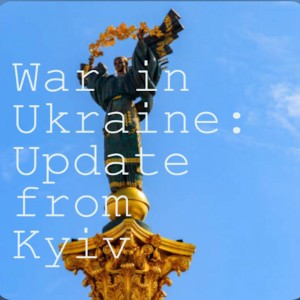
War in Ukraine: Update from Kyiv
News:Politics

Oleksa Drachewych, Assistant Professor in History at Western University, discusses the echoes of history in Russia's invasion of Ukraine: implications of the Bolshevik revolution and its aftermath, the use of narrative and symbols from World War II, and the brutal echoes of history in the way in which Russia has been carrying out the current invasion of Ukraine.
The current Russian regime "by conflating the Soviet experience [in World War II] to being Russian - they are essentially removing the Ukrainian experience from the broader narrative."
"The Russian rhetoric that tends to dehumanise Ukrainians very much mimics a lot of the way that the Soviet Union aimed to dehumanise the Germans, Romanians and others... during the Second World War... and that... dehumanisation then turned into violence and anger against civilians".
Oleksa Drachewych on Calls for peace in Ukraine a year after Russia’s full-scale invasion are unrealistic
Oleksa Drachewych on How Russia’s fixation on the Second World War helps explain its Ukraine invasion
Oleksa Drachewych on Putin's War on Ukraine and on History
Oleksa Drachewych on twitter: @ODrachewych
Jessica Genauer on twitter: @jessicagenauer
More about the host: Jessica Genauer
More Episodes
121. ANALYSIS: Bastian Brinkmann on Germany, weapon supplies to Ukraine, and Russia’s invasion
 2023-01-26
2023-01-26
 3.2k
3.2k
120. ANALYSIS: Lucan Way on Revolution and Dictatorship: durablility of the Soviety Union, legacies for Putn’s regime, & trajectory of the war in Ukraine
 2023-01-21
2023-01-21
 3.1k
3.1k
119. ANALYSIS: Keir Giles on Russia’s War on Everybody and the war in Ukraine
 2023-01-09
2023-01-09
 3.9k
3.9k
118. UPDATE: Maksym Yali forecasts trajectory of Russia’s war in Ukraine in 2023
 2023-01-08
2023-01-08
 2.8k
2.8k
117. UPDATE: Maksym Yali on attacks on Kyiv & Putin’s ’ceasefire’ declaration
 2023-01-07
2023-01-07
 2.2k
2.2k
116. ANALYSIS: Greta Uehling on ’Everyday War’ in Ukraine - how Russia’s war in Ukraine has impacted civilian lives since 2014
 2022-12-21
2022-12-21
 3.0k
3.0k
115. ANALYSIS: James Rodgers on Russia’s media environment: foreign reporting from Moscow, changes from the 1990s to today, and the sharp turn since Russia’s full-scale invasion of Ukraine
 2022-12-16
2022-12-16
 2.7k
2.7k
114. ANALYSIS: Paul Goode on Russian nationalism and the war in Ukraine
 2022-12-05
2022-12-05
 3.2k
3.2k
113. UPDATE: Maksym Yali on life in Kyiv after infrastructure attacks, Ukrainian resilience and resolve & what to expect on the battlefront over the winter
 2022-11-29
2022-11-29
 2.3k
2.3k
112. ANALYSIS: Alexander Lanoszka on military alliances, NATO’s response to war in Ukraine, and how the Ukraine war will shape military alliances in the twenty-first century
 2022-11-25
2022-11-25
 2.4k
2.4k
111. ANALYSIS: Una Bergmane on Baltic states’ independence; Soviet echoes in invasion of Ukraine; possiblity of Russian military clash with Baltic states & performative insanity in Russian rhetoric
 2022-11-19
2022-11-19
 2.7k
2.7k
110. ANALYSIS: Collin Koh on maritime security concerns in SEA - China / India maritime power; lessons learnt from maritime conflict in Ukraine war; and likelihood of a clash between China & Taiwan
 2022-11-13
2022-11-13
 2.6k
2.6k
109. ANALYSIS: Mack Tubridy reflects on Russian response to full-scale invasion, mobilization & the impact on Georgia of influx of Russian emigres
 2022-11-08
2022-11-08
 2.3k
2.3k
108. ANALYSIS: Botakoz Kassymbekova on the Soviet project as settler colonialism, legacies, & implications for the war in Ukraine
 2022-11-06
2022-11-06
 2.5k
2.5k
107. ANALYSIS: US Army Lieutenant Col. Paul Lushenko on drone warfare, legitimacy and the war in Ukraine
 2022-10-29
2022-10-29
 2.9k
2.9k
106. ANALYSIS: Stephan Fruehling on Russia’s nuclear threats, deterrence, China’s strategic interests and the war in Ukraine
 2022-10-23
2022-10-23
 2.5k
2.5k
105. DEEP DIVE: Ian Garner on the Battle of Stalingrad, national identity, war narratives, and echoes of these narratives in Putin’s rhetoric on Russia’s war in Ukraine
 2022-10-21
2022-10-21
 2.0k
2.0k
104. KYIV UPDATE: Maksym Yali comments on who likely bombed the Kerch Bridge & atmosphere in Kyiv following missile strikes
 2022-10-15
2022-10-15
 2.3k
2.3k
103. ANALYSIS: Denis Kazakiewicz on Belarus, the war in Ukraine, recent joint Russia-Belarus military group, how the war affects the Belarusian population & impacts Lukashenko’s grip on power
 2022-10-12
2022-10-12
 2.2k
2.2k
102. ANALYSIS: Azamat Junisbai reflects on Kazakh identity, Russian dominance, the war in Ukraine, and the process of decolonizing one’s own mind
 2022-10-10
2022-10-10
 1.9k
1.9k
Create your
podcast in
minutes
- Full-featured podcast site
- Unlimited storage and bandwidth
- Comprehensive podcast stats
- Distribute to Apple Podcasts, Spotify, and more
- Make money with your podcast
It is Free

- Privacy Policy
- Cookie Policy
- Terms of Use
- Consent Preferences
- Copyright © 2015-2024 Podbean.com


 iOS
iOS Android
Android